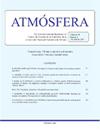Spatial and temporal changes of land uses and its relationship with surface temperature in western Iran
IF 1
4区 地球科学
Q4 METEOROLOGY & ATMOSPHERIC SCIENCES
引用次数: 0
Abstract
A Split-Window algorithm has been used in the Ilam Dam watershed to determine the relationship between Land Surface Temperature (LST) and types of land use. Landsat satellite images of TM sensor for 1990, 1995, 2000, 2005 and 2010 and Landsat 8 (OLI Sensor) for 2015 and 2018 are used. After geometric and radiometric corrections of satellite images, land use maps are extracted by using Fuzzy ARTMAP method. An accuracy assessment showed that the highest value of the Kappa coefficient was 94% with a total accuracy of 0.95 for 2015, and that the lowest Kappa coefficient value was 87% with a total accuracy of 0.9 for 1990. The high values of these coefficients indicate the acceptable accuracy of using Landsat's remote sensing data for land use detection. The most important land use change is related to dense forest and sparse forest land uses, with a decrease of 20.07 and 17.04 percent, respectively. The minimum LST measures in 1990, 2010, and 2018 in dense forest are 21.27, 30.55 and 33.82 °C respectively. The maximum LST for the sparse forest land use in 1990 and 2010 are 52.48, 56.09, and for the dense forest land use in 2018 is 56.10 °C. As a result, the average LST in agricultural lands was lower than in sparse forest and rangeland; this is mainly due to the high moisture content and the greater evapotranspiration rate. Land Use / Land Cover (LULC) variations from 1990 to 2018 show that all land uses have experienced an increase in LST.伊朗西部土地利用时空变化及其与地表温度的关系
Ilam Dam流域使用了分割窗口算法来确定地表温度(LST)与土地利用类型之间的关系。使用了1990年、1995年、2000年、2005年和2010年TM传感器的陆地卫星图像以及2015年和2018年的陆地卫星8号(OLI传感器)。在对卫星图像进行几何和辐射校正后,利用模糊ARTMAP方法提取土地利用图。准确度评估显示,2015年Kappa系数的最高值为94%,总准确度为0.95,1990年Kappa系数值的最低值为87%,总准确率为0.9。这些系数的高值表明使用陆地卫星遥感数据进行土地利用检测的精度是可以接受的。最重要的土地利用变化与密林和疏林土地利用有关,分别减少了20.07%和17.04%。1990年、2010年和2018年密林的最低LST测量值分别为21.27、30.55和33.82°C。1990年和2010年稀疏林地利用的最大LST为52.48、56.09,2018年茂密林地利用的最高LST为56.10°C。因此,农业用地的平均地表温度低于稀疏森林和牧场;这主要是由于高含水量和较大的蒸散率。1990年至2018年的土地利用/土地覆盖变化表明,所有土地利用都经历了LST的增加。
本文章由计算机程序翻译,如有差异,请以英文原文为准。
求助全文
约1分钟内获得全文
求助全文
来源期刊

Atmosfera
地学-气象与大气科学
CiteScore
2.20
自引率
0.00%
发文量
46
审稿时长
6 months
期刊介绍:
ATMÓSFERA seeks contributions on theoretical, basic, empirical and applied research in all the areas of atmospheric sciences, with emphasis on meteorology, climatology, aeronomy, physics, chemistry, and aerobiology. Interdisciplinary contributions are also accepted; especially those related with oceanography, hydrology, climate variability and change, ecology, forestry, glaciology, agriculture, environmental pollution, and other topics related to economy and society as they are affected by atmospheric hazards.
 求助内容:
求助内容: 应助结果提醒方式:
应助结果提醒方式:


